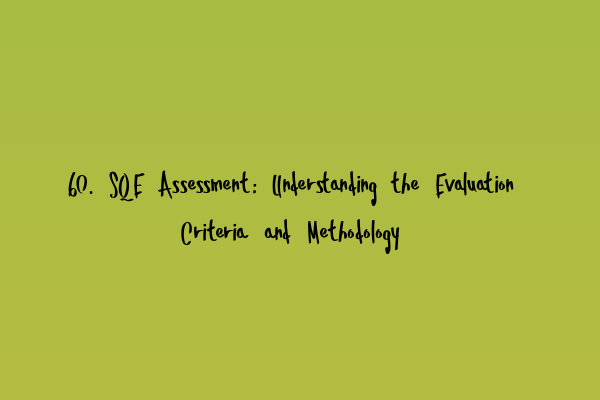60. SQE Assessment: Understanding the Evaluation Criteria and Methodology
Welcome to SQE Exam Law’s comprehensive guide to understanding the evaluation criteria and methodology for the Solicitors Qualifying Examination (SQE). As a solicitor, it is crucial to be familiar with how the assessment process works in order to excel in this important examination.
The SQE is designed to measure your competence to practice as a solicitor. It evaluates your knowledge, skills, and abilities across two stages: SQE1 and SQE2. Let’s take a closer look at the evaluation criteria and methodology for each stage:
SQE1 Evaluation Criteria
The SQE1 assessments focus on assessing your legal knowledge and understanding. The evaluation criteria used are based on the Solicitors Regulation Authority (SRA) Standards and Regulations. This stage consists of multiple choice questions (MCQs) and written tasks that simulate real-life scenarios.
During this stage, you will be tested on various areas of law, including but not limited to contract law, criminal law, property law, and tort law. It is essential to have a solid understanding of these subjects to perform well in this assessment.
To successfully navigate the SQE1 evaluation criteria, consider using proven tactics and strategies. You can find useful tips in our related article: SQE Strategies: Proven Tactics to Ace the Solicitors Qualifying Examination.
SQE2 Evaluation Criteria
The SQE2 assessments focus on assessing your practical legal skills. This stage is designed to mimic real-life legal practice scenarios, testing your ability to apply legal knowledge and skills to solve complex problems. The evaluation criteria for SQE2 are based on the SRA Competence Statement, which outlines the key competencies required for solicitors.
During this stage, you will encounter various task-based assessments that resemble real-life legal scenarios. These assessments may include client interviewing, advocacy, legal research, and drafting. It is crucial to demonstrate strong analytical and problem-solving skills to succeed in SQE2.
To prepare effectively for the SQE2 assessment, consider practicing with case studies that apply knowledge in real-life scenarios. You can find valuable resources in our related article: SQE Case Studies: Applying Knowledge in Real-Life Scenarios.
Evaluation Methodology
The evaluation methodology for the SQE follows a rigorous and fair process to ensure the accuracy and reliability of the results. The assessments are designed and delivered by assessment providers appointed by the SRA. These providers adhere to strict quality assurance standards to maintain the integrity of the examination process.
Throughout the assessment process, your performance is evaluated using criteria such as knowledge and understanding of legal principles, application of legal knowledge to practical scenarios, problem-solving skills, professional ethics, and communication skills.
It is vital to develop a solid exam strategy to maximize your performance in the SQE assessments. Learn how to plan and execute for optimal performance in our related article: SQE Exam Strategy: Planning and Executing for Optimal Performance.
Conclusion
Understanding the evaluation criteria and methodology for the SQE is essential for success in this important examination. By familiarizing yourself with the criteria and following effective exam strategies, you can increase your chances of performing well in both SQE1 and SQE2.
For more information on the SQE and how it can serve as your gateway to legal practice, read our related article: Solicitors Qualifying Examination (SQE): Your Gateway to Legal Practice.
Finally, mastering time management is crucial for efficient exam completion. Discover strategies to optimize your time management skills in our related article: Mastering Time Management in SQE: Strategies for Efficient Exam Completion.
We hope this guide has provided you with a better understanding of the evaluation criteria and methodology for the SQE. Good luck with your preparation and future legal career!
